
The Tragedy of Thai Democracy
Five years ago, Thailand had a thriving and developing democracy with freedom of expression, a relatively free press and an active civil society where social movements campaigned to protect the interests of the poor. Today, the country is creeping towards totalitarianism.
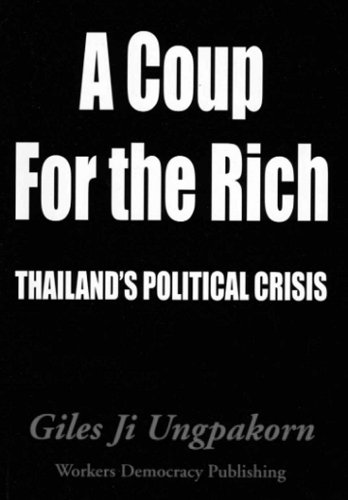
Controversy by Censorship. In A Coup for the Rich, Giles Ji Ungpakorn analysed the background and implications of the military coup that usted former Thai Premier Thaksin Shinawatra. The book not only dissected the distress of the country’s elites over the popularity of Shinawatra’s regime but also uncovered the subtle yet full support of the monarchy of such a political takeover, which closure continues to pervade present Thai politics.
The government, led by the mis-named Democrat Party, is only in power because of the military who staged a coup in 2006. The army ripped up the best constitution Thailand ever had and replaced it with their own one.
The government is vicious and paranoid. Its priority is to stifle dissent by using the lese majeste law. Anyone who criticises the government or the army is deemed to have insulted the King. They are censoring the electronic media and community radio stations and are encouraging citizens to inform on each other. People are being arrested after their computer IP numbers are traced. They are thrown in jail, before trial, for posting comments on the internet. The TV and print media are already working hand in glove with the military.
The courts have been used as an instrument of dictatorship, repeatedly dissolving the party that won most of the popular vote. Judges protect themselves by threatening anyone who dares to criticise them with a jail sentence for “contempt of court.” They claim that anyone who criticises the courts is criticising the King. Lese majeste trials are given little publicity and society cannot find out what actions are deemed to have insulted the King.
There is no transparency and accountability, no justice, no freedom of speech and no academic freedom.
In early 2007, I published a book called A Coup for the Rich. This short academic book was written as a protest against the shrinking democratic space in Thailand. I tried to analyse what exactly was happening to Thai democracy. I criticised the gross human rights abuses of the democratically elected Thaksin government. Thaksin presided over extra judicial killings in his so-called war on drugs and in the three southern Muslim provinces.
How can there be academic freedom when my own university, Chulalongkorn University, gave my book to the police? How can there be academic standards if political scientists like myself are not allowed to discuss what the King, the army and the elites do?
But I argued that a military coup was not the answer. Those people in society who supported the 2006 coup included most of Thai academia, over half the non-government organisations (NGO) movement and the missnamed “Peoples Alliance for Democracy” (PAD). The military and the PAD constantly claimed legitimacy from the King. Because I discussed all this, I was charged with lese majeste or insulting the King.
How can there be academic freedom when my own university, Chulalongkorn University, gave my book to the police? How can there be academic standards if political scientists like myself are not allowed to discuss what the King, the army and the elites do?
After the 2006 coup, the PAD soon descended into a fascist type of organisation. It took on an ultra-Royalist and ultranationalist politics. Its supporters wore Royal yellow shirts. It nearly caused a war with Cambodia over an ancient hill-top ruin. It built up an armed guard who openly carried and used weapons on the streets of Bangkok. They took over Government House, closed parliament and then moved on to occupy the two international airports. They were backed by the army and the elites including members of the Royal Family.
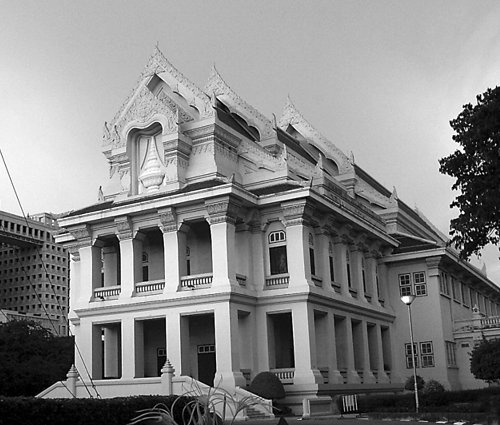
Tied to the Ground. Chulalongkorn University, Thailand’s leading educational institution relented to the authorities when A Coup for the Rich caused a stir. Its lecturer, the author eventually had to flee to Great Britian.
Photo by Carnopus from Wikimedia Commons.
The present Thai Foreign Minister is a PAD supporter who took part in the illegal occupation of the airports. The PAD’s media outlet, Manager Group have started witch hunts against academics and social activists who question the deterioration of democracy and question the use of lese majeste. It encourages people to commit acts of violence against those who think differently. The civil war which is developing in Thailand is a class war between the rich and the poor. But it is very distorted and complicated. Those “Yellow Shirts” who backed the coup and the subsequent undemocratic measures hated the fact that Thaksin’s Thai Rak Thai government won huge support for providing universal health care and public projects to lift people out of poverty.
Their excuse for backing a coup was to say that the electorate, especially the poor, had been bribed and were too stupid to deserve the right to vote. They want a rigged parliament where the poor only get to vote for a few MPs . They call this the “New Order” or “New Politics.”
Yet, Thaksin was no socialist and his was a party of Big Business. He was modernist and believed that the poor should become stakeholders in society. Since his overthrow and as a result of the prolonged crisis, a grassroots “Red Shirt” movement has developed. It is now being built by ordinary citizens who want democracy and freedom. They are moving beyond Thaksin.
Letter In April 2009, Suwicha Thakor was sentenced to 10 years imprisonment under the 2007 Computer Crime Act and lese majeste laws, after allegedly posting altered photographs of King Bhumibol Adulyadej on the internet. As a result of an international clamour over the harsh penalties for lese majeste violations, Thailand appointed Kittipong Kittayarak as permanent secretary of the Ministry of Justice to oversee lese majeste cases in January 2010. However, it is said that Suwicha is unlikely to benefit from this development. 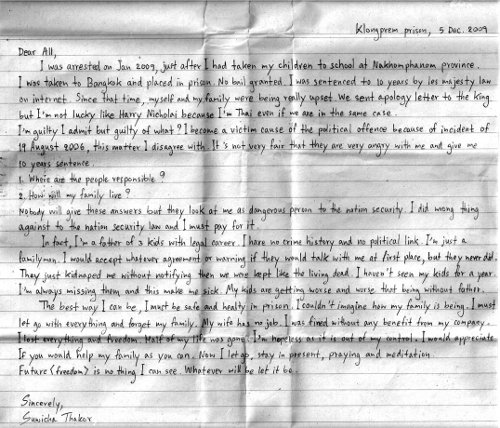
In his article “Thailand’s ‘New’ Approach to Lese Majeste,” Frank Anderson wrote, “Unfortunately for those now in prison, Kiitipong seems not to have been chosen for his compassion or his embarrassment over injustice meted out to the undeserving as much as for his status-quo leanings.”
In January 2010, Reporters without Borders obtained a copy of Suwicha’s letter, written in prison. Part of it reads: “We sent [an] apology letter to the King but I’m not lucky like Harry Nicholai because I’m Thai even if we are in the same case…They look at me as [a] dangerous person to national security.” Nicholai is an Australian author who was likewise charged with lese majeste but was extradited.
Sources: Anderson, Frank (19 January 2010). “Thailand’s ‘New’ Approach to Lese Majeste.”; Reporters Without Borders. (3 April 2009). “Internet user gets ten years in jail for posting content that ‘defamed’ monarchy.”; and Thakor, Suwicha. (5 December 2009). (Letter from Prison).
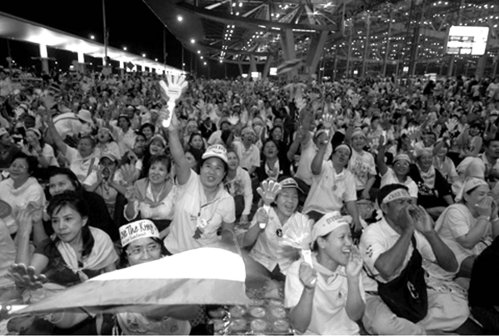
Airport Protest. At the tail end of November 2008, supporters of the monarchy and military-backed People’s Alliance for Democracy gathered at Suvarnabhumi airport, one of Asia’s more important transportation hubs, stranding more than 100,000 travelers and hurting the country’s tourism industry. But months before this, PAD supporters were milling at strategic sites in Bangkok such as the Government House. Driven by Thailand’s middle class, such gatherings were broadcast live over the television owned by a PAD leader and media mogul.
Source: Roberts, John (1 December 2008). “Airport occupations bring Thailand to political breaking point.”
What is also amazing is that this is becoming a Republican movement because of the actions of the military and the PAD in dragging the Monarchy into politics. The King has never once spoken out against the destruction of democratic rights and allows people to crawl on the ground in front of him. He has had the arrogance to lecture the poor that they must find “sufficiency” in their poverty. He was recently named as the richest monarch in the world.
The army, the conservative elites and the Democrat Party have no democratic legitimacy, so they cling to the coat-tails of the Monarchy instead. They are frightened that this Royal legitimacy is quickly evaporating and at a time when the King is getting very old. His son is held in contempt by the population because he is known as a thug who parades his wife naked for video snap shots. Most Thais have seen these videos and photographs.
One worrying question is why most academics support the military and the PAD. Equally worrying is why decent NGO activists and some trade unionists did so too. As far as the academics are concerned, even those claiming to be “liberal” were always elitist. Most believed that the problem of Thai democracy was the fact that the poor lacked education. But the education system that these academics have promoted is one where students learn everything by rote. The idea that an essay in politics might discuss arguments, rather than be merely descriptive, is met with surprise.
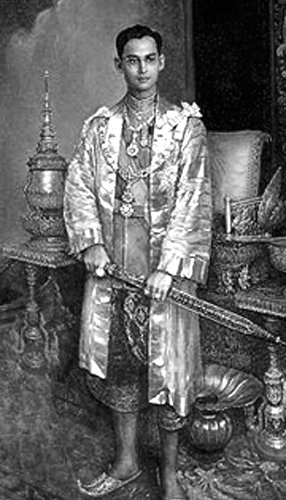
The King. Bhumibol Adulyadej, the world’s longest serving leader and monarch is a revered figure in Thailand. Although he himself decried the neardivinity that many people attribute to him, the government has yet to soften its stance on lese majeste – a trend that is hardly surprising given the very tenuous state of Thai politics.
Photo from Wikimedia Commons.
The NGO movement has a different problem. It is a movement which turned its back on politics and concentrated on singleissues and lobbying governments of any shade and colour. The movement swung from admiration of the Thaksin government to supporting the military coup. In a nutshell then, the old groups in civil society have helped to create the monster of the “New Order” that is now strangling Thai Democracy.
A new civil society is emerging from the Red Shirt movement. Many will feel uncomfortable that this is a movement of ordinary citizens and not the middle class. But this is what is really required to build a democratic society with social justice.
We need to cut down the military’s influence in society, reform the judiciary and the police and to expand freedom and democracy from this grassroots movement. And we need to rethink the Monarchy too.





 The
The 
 Isis Resource Center holds one of the largest feminist collections of materials in the Global South. With 40 years of publication experience, Isis holds a vast collection.
Isis Resource Center holds one of the largest feminist collections of materials in the Global South. With 40 years of publication experience, Isis holds a vast collection.